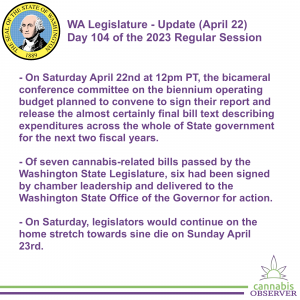The biennium operating budget as revised by fiscal committee leadership from both chambers would be published on Saturday at noon, the second to last day of the 2023 regular session.
Here are some observations of the Washington State Legislature (WA Legislature) for Saturday April 22nd, the 104th day of the 2023 Regular Session.
My top 3 takeaways:
- On Saturday April 22nd at 12pm PT, the bicameral conference committee on the biennium operating budget planned to convene to sign their report and release the almost certainly final bill text describing expenditures across the whole of State government for the next two fiscal years.
- SB 5187 - "Making 2023-2025 fiscal biennium operating appropriations.”
- On Wednesday April 19th, legislative staff announced the signing ceremony would be hosted on Saturday at noon, procedurally requiring both chambers to review the legislation for a full day before taking up concurrence votes on the report and final passage of the legislation on Sunday - the last day of the 2023 regular session.
- Joint Rule 20 of the Senate and House for the 2023-24 Legislature on “Adoption of Reports” notes, “The report must be voted upon in its entirety and cannot be amended.”
- The bill text as revised by the conference committee—possibly inclusive of new cannabis-specific budget provisos—would be made publicly available at the same time as the signing ceremony on the Washington State Legislative Evaluation and Accountability Program (LEAP) website and probably more directly on the Washington State Fiscal Information screen for SB 5187.
- Of seven cannabis-related bills passed by the Washington State Legislature (WA Legislature), six had been signed by chamber leadership and delivered to the Washington State Office of the Governor (WA Governor) for action.
- At publication time, six cannabis-related bills were on the Governor’s desk:
- HB 1066 - “Making technical corrections and removing obsolete language from the Revised Code of Washington pursuant to RCW 1.08.025.”
- HB 1563 - “Concerning arrest protections for the medical use of cannabis.”
- HB 1772 - “Prohibiting products that combine alcohol and tetrahydrocannabinol.”
- SB 5069 - “Allowing interstate cannabis agreements.”
- SB 5080 - “Expanding and improving the social equity in cannabis program.”
- SB 5367 - “Concerning the regulation of products containing THC.”
- One cannabis bill remained within the Legislature gathering the signature of the Speaker of the House:
- SB 5123 - “Concerning the employment of individuals who lawfully consume cannabis.”
- The Executive exercises a check on the power of the Legislative branch when the Governor signs the bill into law or vetoes all or part of the legislation. If the Governor fails to act on the bill, it may become law without a signature. Bills passed more than five days before adjournment of a session must be acted upon within five days. Bills passed within five days of sine die can be acted upon within 20 days.
- All of the cannabis-related legislation passed by the Legislature was delivered to the WA Governor within five days of sine die.
- See the WA Governor Bill Action screen for notification of bill action ceremonies on the day of the event.
- At publication time, six cannabis-related bills were on the Governor’s desk:
- On Saturday, legislators would continue on the home stretch towards sine die on Sunday April 23rd.
- The Washington State House planned to convene on 9am PT on Saturday.
- All cannabis bills available to representatives for concurrence with Senate changes had been passed by the body.
- The conference committee on SB 5187, the biennium operating budget, was scheduled to sign the conference report on Saturday at 12pm PT coincident with the publication of the revised bill text.
- The Washington State Senate planned to convene at 1pm PT on Saturday.
- All cannabis bills available to senators for concurrence with House changes had been passed by the body.
- Legislation can be declared "necessary to implement budgets" (NTIB), an informal procedure leadership can exercise around any bill with a fiscal impact. The criteria for NTIB status and the decision making around the designation hadn’t been set in law or rule, allowing for a bypass of the cutoff calendar which is agreed to by both chambers through the legislative process.
- Sunday April 23rd would occasion sine die, the end of the regular session, described as the “Last day allowed for regular session under state constitution.”
- The Washington State House planned to convene on 9am PT on Saturday.
